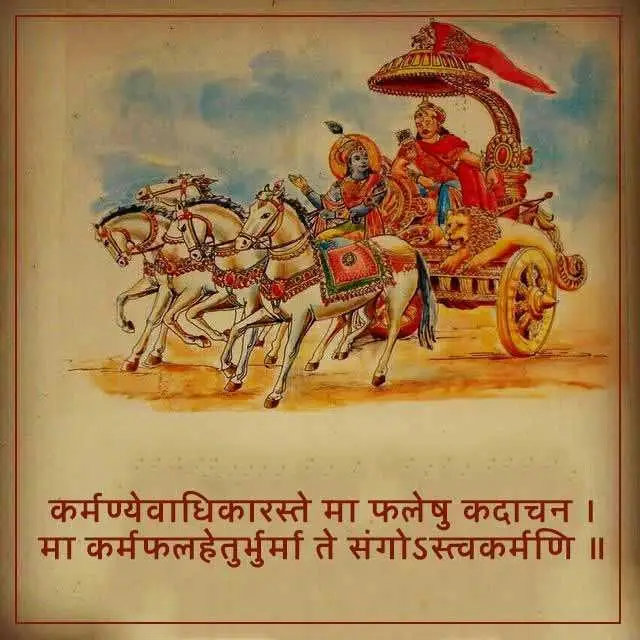5 Shlokas from the Bhagavad Gita with Full Verses and Practical Applications
The Bhagavad Gita continues to serve as a profound source of guidance, helping individuals find clarity, wisdom, and spiritual direction. Each shloka offers unique insights into the path of righteousness, mental peace, and self-realization. Below are five more shlokas, complete with translations and practical applications.
1. Shloka: Chapter 2, Verse 47
कर्मण्येवाधिकारस्ते मा फलेषु कदाचन। मा कर्मफलहेतुर्भूर्मा ते सङ्गोऽस्त्वकर्मणि॥
Translation: “You have a right to perform your prescribed duties, but you are not entitled to the fruits of your actions. Never consider yourself the cause of the results of your activities, nor be attached to inaction.”
Application in Life:
This famous shloka emphasizes the importance of focusing on actions and duties without attachment to their outcomes. It teaches that by letting go of expectations, we reduce anxiety and stress, which arise from focusing too much on results.
Example:
When working on a project or personal goal, focus on giving your best effort, but avoid stressing about the final result. This mindset helps in maintaining peace and balance.
2. Shloka: Chapter 6, Verse 6
बन्धुरात्मात्मनस्तस्य येनात्मैवात्मना जित:। अनात्मनस्तु शत्रुत्वे वर्तेतात्मैव शत्रुवत्॥
Translation: “For one who has conquered the mind, the mind is the best of friends; but for one who has failed to do so, the mind will remain the greatest enemy.”
Application in Life:
This shloka teaches the significance of mastering the mind. A disciplined and controlled mind acts as a person’s greatest ally, leading to success and peace. On the other hand, an undisciplined mind becomes an enemy, creating confusion and chaos.
Example:
To gain control over your mind, incorporate daily mindfulness or meditation practices. By mastering your thoughts, you can make better decisions and lead a more balanced life.
3. Shloka: Chapter 3, Verse 35
श्रेयान्स्वधर्मो विगुण: परधर्मात्स्वनुष्ठितात्। स्वधर्मे निधनं श्रेय: परधर्मो भयावह:॥
Translation: “It is far better to perform one’s own duties imperfectly than to perform the duties of another perfectly. Destruction in the course of performing one’s own duty is better than engaging in the duty of another, for following another’s path is dangerous.”
Application in Life:
This shloka underscores the importance of following one’s own path, even if imperfect. Imitating others’ journeys or focusing on others’ duties can lead to dissatisfaction and inner conflict. Staying true to one’s purpose, even if challenging, leads to greater fulfillment.
Example:
When choosing a career path or personal goals, focus on what aligns with your unique abilities and values. Don’t be tempted by what others are doing; stay true to your purpose.
4. Shloka: Chapter 5, Verse 18
विद्या विनयसम्पन्ने ब्राह्मणे गवि हस्तिनि। शुनि चैव श्वपाके च पण्डिता: समदर्शिन:॥
Translation: “The humble sages, by virtue of true knowledge, see with equal vision a learned and gentle brahmana, a cow, an elephant, a dog, and a dog-eater.”
Application in Life:
This shloka teaches the principle of equality and the importance of seeing the divine in all living beings. True wisdom brings the understanding that all life forms are manifestations of the same universal energy, and therefore, all deserve equal respect.
Example:
Practice kindness and respect toward all beings, regardless of their social or economic status. Cultivate empathy and equality in everyday interactions, treating everyone with the same dignity.
5. Shloka: Chapter 12, Verse 15
यस्मान्नोद्विजते लोको लोकान्नोद्विजते च य:। हर्षामर्षभयोद्वेगैर्मुक्तो य: स च मे प्रिय:॥
Translation: “He who neither disturbs the world nor is disturbed by it, who is free from joy, envy, fear, and anxiety, is dear to Me.”
Application in Life:
This shloka emphasizes equanimity—remaining undisturbed by external circumstances and emotions. Such a person maintains inner peace, regardless of praise or criticism, success or failure, and becomes spiritually connected to the divine.
Example:
When faced with stressful situations, practice remaining calm and centered. By not reacting to external triggers, you can cultivate inner peace and strength, which will also make you more resilient in the face of challenges.
Conclusion
The teachings of the Bhagavad Gita continue to offer guidance for navigating life’s complexities with wisdom and compassion. These five additional shlokas provide profound insights into self-mastery, non-attachment, equality, and the power of staying true to one’s own path.

